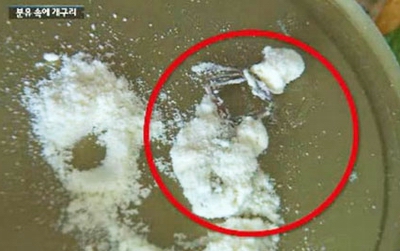
The government said Wednesday that it launched an inspection into Namyang Dairy Products as the mother of a six-month baby girl claimed she found a dead frog inside the company’s infant formula Monday.
The Ministry of Food and Drug Safety said that its investigators are examining how the 4.5 centimeter-long frog came to be inside the can of Namyang’s trademark premium baby formula named Imperial XO.
“We are looking into whether the frog came to be there during the company’s manufacturing process or while it was delivered to retailers, or after it was purchased by a consumer. Depending on what we find, we will implement measures to solve the problem, including a recall of the product,” said Ahn Man-ho, a spokesman of the ministry.
Ahn said that the investigation will be completed soon but was not sure when the findings will be announced.
Representatives of Namyang were not available for comment.
The case was unveiled as the mother living in Mokpo, South Jeolla Province posted photos of the frog in the formula on a local online forum, which drew huge attention from Internet users. The news spread quickly through social networking sites, including Twitter, as people who were upset with the incident reposted it.
The incident came three months after the nation’s leading dairy company was accused by its sales agents of forcing them to buy products whose shelf life was expiring. Namyang was also criticized for verbally abusing its sales agents.
The case rekindled debates on business relationships between big companies and their small contractors here on the back of the so-called “economic democratization” movement, which seeks to protect small business owners from their bigger business partners and giant conglomerates.
It was the latest case in a series of incidents in which undesirable materials were found in food products. In October 2012, the food safety agency recalled six ramen products, including Nongshim’s trademark Shin Ramyun, as they contained substances which could cause cancer.
In December 2010, a dead rat was found inside a loaf of bread bought from a branch of Paris Baguette in Yongin, Gyeonggi Province. It turned out that an owner of a Tour Les Jours branch in the neighborhood planted it to damage the rival bakery’s reputation.






